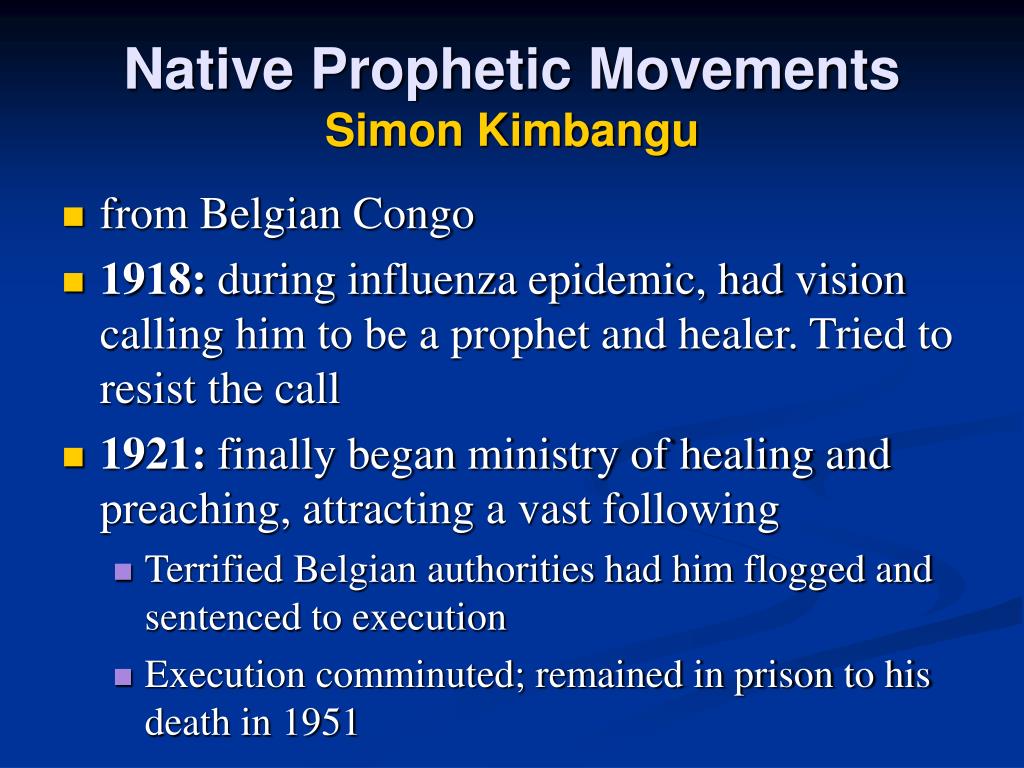
Have you ever come across the remarkable story of a man whose teachings ignited a profound religious transformation in the heart of Africa? Allow me to introduce you to **Simon Kimbangu**, a prominent Congolese religious leader whose influence and legacy continue to resonate powerfully in contemporary society. Born around September 12, 1887, in Nkamba, near Thysville, in what is now known as the **Democratic Republic of the Congo**, Kimbangu’s life journey is a testament to resilience and spiritual awakening. Emerging from a modest background, he rose to prominence as a revered prophet, captivating the hearts and minds of many with his visionary teachings. His impact on the religious landscape of Africa is not only significant but also enduring, as his followers and the principles he espoused continue to thrive, shaping the spiritual lives of countless individuals. Kimbangu’s story is one of inspiration, illustrating how a single individual can spark a movement that transcends time and borders.
Early Life and Background

Childhood Influences
Kimbangu’s formative years were deeply rooted in the teachings and values of the British Baptist Missionary Society, where he spent his childhood. Growing up in such a mission environment, he was immersed in Christian doctrines and principles from an early age. This upbringing was not merely a backdrop; it significantly influenced his spiritual beliefs and practices, laying the foundation for his future endeavors. The teachings he absorbed during these early years instilled in him a profound sense of faith and purpose. However, what truly distinguished Kimbangu from others was the unique combination of his cultural heritage and the religious education he received, which would later play a pivotal role in his life and mission.
The Awakening of a Prophet
In April 1921, a transformative event occurred that would alter the course of Kimbangu’s life forever. He began to exhibit extraordinary abilities, performing miraculous healings that astonished those around him. His claims of raising the dead further propelled him into the spotlight, capturing the attention and admiration of the Bakongo people. This sudden rise to prominence was not merely a fleeting moment of fame; it marked the inception of a significant religious movement that would profoundly impact the spiritual landscape of the region. Kimbangu’s actions resonated deeply with the community, igniting a wave of faith and hope that would inspire countless individuals and reshape their understanding of spirituality.
The Rise of Kimbanguism

The Birth of a New Faith
As the influence and reputation of Simon Kimbangu began to expand, so too did the number of individuals who chose to follow him. He became affectionately known as Ngunza, a term that translates to “prophet” in the Kikongo language. His powerful sermons drew in thousands of people, all eager to hear his uplifting messages centered around hope, healing, and spiritual renewal. But what exactly lay at the heart of Kimbangu’s teachings that resonated so deeply with his followers?
Core Beliefs of Kimbanguism
- Divine Healing: One of the fundamental tenets of Kimbanguism is the belief in the transformative power of faith, particularly in the context of healing the sick. Kimbangu taught that through faith, individuals could experience miraculous recoveries and restoration of health.
- Spiritual Equality: Kimbangu’s teachings strongly advocated for the notion that all individuals are equal in the eyes of God, regardless of their social status, ethnicity, or background. This principle of spiritual equality was revolutionary and provided a sense of dignity and worth to many who had been marginalized.
- Community and Unity: Kimbanguism placed a significant emphasis on the importance of community and unity among its followers. Kimbangu encouraged his adherents to come together, support one another, and foster a sense of belonging, thereby creating a strong network of mutual aid and solidarity.
Through these core beliefs, Kimbanguism not only provided spiritual guidance but also offered a framework for social cohesion and empowerment, making it a powerful movement that resonated with many in the region.
Conflict with Colonial Authorities

Arrest and Imprisonment
Despite the peaceful nature of his teachings and messages, the growing influence of Simon Kimbangu became a source of concern for the Belgian colonial authorities. In September 1921, they took decisive action by arresting Kimbangu along with many of his devoted followers. Initially, he faced a death sentence, a reflection of the perceived threat he posed to colonial order. However, this harsh punishment was later commuted, and Kimbangu found himself confined to a prison cell in Élisabethville, which is known today as Lubumbashi. There, he would spend the remainder of his life, cut off from the movement he had inspired.
The Impact of Imprisonment
Even while Kimbangu was incarcerated, the impact of his teachings continued to resonate throughout the region. His followers remained steadfast and undeterred by his absence, actively working to spread his messages and principles. This grassroots effort led to the propagation of Ngunzism, a spiritual and social movement that would eventually evolve into what is now known as Kimbanguism. The movement gained significant traction not only within the borders of the Belgian Congo but also extended its reach into neighboring areas, including French Congo and Angola. Kimbangu’s legacy, therefore, continued to grow, illustrating the enduring power of his message even in the face of oppression.
The Legacy of Simon Kimbangu

Posthumous Recognition
Even after his death on October 10, 1951, Kimbangu’s influence did not wane. In the 1950s, during a period of African nationalism, his followers, led by his son Joseph Diangienda, founded the Kimbanguist Church. This church received official recognition in September 1959, solidifying Kimbangu’s legacy as a significant religious figure.
Kimbanguism Today
Today, Kimbanguism is a thriving faith with millions of adherents. It emphasizes spiritual healing, community support, and the importance of African identity. But how does Kimbanguism compare to other religious movements?
| Aspect | Kimbanguism | Other Religious Movements |
|---|---|---|
| Founding Figure | Simon Kimbangu | Varies (e.g., Jesus, Muhammad) |
| Core Beliefs | Healing, Equality, Community | Varies (e.g., Salvation, Enlightenment) |
| Geographical Spread | Congo, Angola, French Congo | Global |
| Recognition | Official Church | Varies (e.g., Denominations) |
The Cultural Impact of Kimbanguism

Art and Music
Kimbanguism has significantly influenced Congolese culture, particularly in art and music. Traditional songs and dances often reflect Kimbangu’s teachings, celebrating themes of healing and unity. Have you ever listened to a Kimbanguist hymn? They are deeply moving!
Social Justice and Activism
The Kimbanguist Church has also been involved in social justice initiatives, advocating for the rights of marginalized communities in the Congo. This activism is a testament to Kimbangu’s vision of equality and community support.

In a world that often feels divided, the teachings of Simon Kimbangu remind us of the power of faith, community, and healing. His life story is not just a historical account; it’s a call to action for all of us to embrace unity and support one another. So, what can we learn from Kimbangu’s journey? Perhaps it’s that true leadership comes from love, compassion, and a commitment to uplifting others.
As we reflect on Kimbangu’s legacy, let’s carry forward his message of hope and healing in our own lives. After all, we all have the potential to be a little more like Ngunza.

